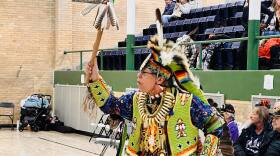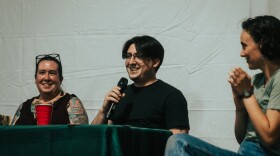-
After a five-year hiatus, the New Year's Eve powwow was revived in Milwaukee.
-
The land transfer marks the first known land transfer between a Catholic institution and a tribal nation.
-
"Spirits Dancing" will highlight the work of Grand Portage Anishinaabe Nation resident and astrophotographer Travis Novitsky.
-
Dewey Schanandore is one of thousands of Indigenous people who attended a residential school in the United States. He shares his story and how he has overcome its lasting challenges.
-
Bazile Panek is a proud member of the Red Cliff Band of Lake Superior Chippewa. When he was just a few days old, he was given the traditional name Minogiizhigaabo, or Standing in the Good Sky. The 25-year-old says it helps ground his determination to be of good heart and good mind in all the work he does.
-
A historical marker used to recognize one of the last remaining Native American burial mounds in Milwaukee County. For "Bubbler Talk," we learn why it was removed and what's next for the sacred burial site.
-
The Marcus Performing Arts Center recently hosted an inaugural Native Heritage Celebration to expose the community to Indigenous cultures.
-
The logging history and culture of northern Wisconsin are remembered differently in Hayward, WI and on the neighboring Lac Courte Oreilles reservation.
-
The Native American Boarding School Healing Coalition is visiting Milwaukee to collect oral histories of the states boarding school survivors.
-
UWM Adjunct Lecturer Marin Denning joins Lake Effect to discuss the impacts of intergenerational trauma on Indigenous communities ahead of a UWM's Trauma in Our Community Conference.
Play Live Radio
Next Up:
0:00
0:00
Available On Air Stations










